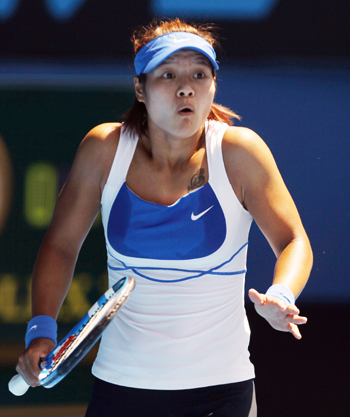
China's hopes of a first grand slam finalist were crushed by two of the greats of the women's game on Thursday but Li Na and Zheng Jie's brilliant Australian Open run marked another step in the country's inevitable rise.
Dubbed China's "Golden Flowers" by an appreciative media at home, Li and Zheng's record-shattering path to the semi-finals at Melbourne Park ignited the draw and offered the astonishing possibility of an all-Chinese final.
That notion was snuffed out when a rampant Justine Henin thumped 35th-ranked Zheng 6-1, 6-0 following Serena Williams's 7-6, 7-6 win over the 16th-seeded Li.
But like Russia's rapid rise to tennis super-power status in the last 10 years, the world will need to get used to seeing more Chinese names at the business end of grand slams.
As with all sports, tennis was once denounced as bourgeois and decadent, and banned in China under the rule of the late Mao Zedong, but the game has come along way in a very short time.
Olympic ambitions have played a big part, with the Communist Party leadership throwing resources, cash and foreign coaches into the game to produce players who can bolster medal counts.
The country's Soviet-style sports system produced a shock gold in Athens in 2004, when Sun Tiantian and Li Ting took the women's doubles title, the same year Li broke through for China's first tour win in the southern city of Guangzhou.
Zheng, who has vied with Li for the number one status in China in recent years, then partnered Yan Zi to clinch the country's first doubles grand slam titles at the Australian Open and Wimbledon in 2006.
Li's breakthrough quarter-final at Wimbledon the same year, followed by Zheng's semi-final there in 2008, continued China's steady march.
While well into middle-age by tennis standards, 27-year-old Li and 26-year-old Zheng are now playing the best tennis of their lives, surprising themselves with their own progress.
"My goal was to make the top 10 this year, but I've already done that," said Li, whose quarter-final win over Venus Williams ensured she will pass the milestone when the new rankings are published on Monday.
"So next, maybe (go for the) top five, like step by step."
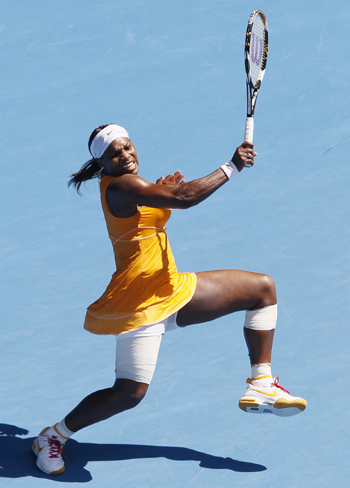
If winning the Australian Open were a simple test of will power, Serena Williams would win every time.
The American has always been one of the most powerful and athletic players on the women's tour but her greatest strengths are not in her body but in her mind.
While other players succumb to self-doubt and nerves when things start going against them, Williams never loses faith in her ability to dig herself out of trouble.
Her fighting qualities have helped her win 11 grand slam titles, including four in Melbourne, and given her a chance at another when she plays Justine Henin in Saturday's final.
Williams booked her place in the final by beating China's Li Na 7-6, 7-6 on Thursday. She was expected to win so the result was no surprise but it was anything but a walkover.
Li, playing the match of her life, gave the world number one a torrid time, thumping into the ball deep into the corners and forcing the American to scamper from side to side.
Already heavily bandaged, Williams looked to be tiring fast but showed why she remains the most feared player in the game by raising her game when it mattered and dominating the tiebreaks.
"I am happy I was able to pull it out, it was really close," Williams said. "I wasn't at my best today but I'm still here -- which is shocking -- and I'm just going to do whatever I can to stay."
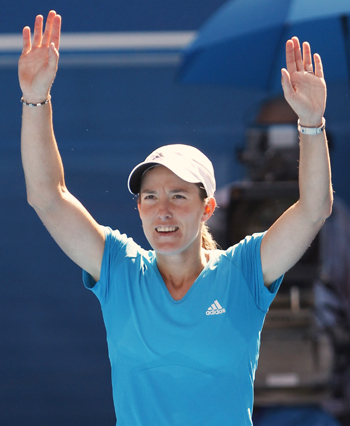
Justine Henin has fallen in love with tennis all over again.
Tennis was always the Belgian's first love but her devotion to the game became so overbearing that she had to split from the sport in 2008.
She was still at the top of her game and ranked number one in the world but the relentless grind of playing, training and travel had taken its toll so she just turned her back and walked away.
"I had to forget a little about tennis and just get some air and breathe differently," she told a news conference after beating China's Zheng Jie 6-1, 6-0 Thursday to reach the final of the Australian Open.
"Tennis has been my whole life (but) I think there is something else than that. It's more than answers. It's just time to get open to different kinds of things.
"I had different kinds of projects, I met a lot of people.
"The answer I got is that I started to trust myself much more as a person and I realised I could exist without tennis. So that was an important step for me."
Tennis was the last thing on Henin's mind during her break from the game.
She began working as an ambassador for Unicef and starred in her own reality TV show. She travelled to places she had never been, to Cambodia and Congo, far away from the bright lights of New York, London, Paris and Melbourne.
It was a spiritual journey that changed her entire outlook on life.
"I just learned a lot of things and grew up," she said.
"Maybe I'm a little older, more mature because of being away from the tour.
"I got off my bubble. It was really important for me, as I feel more in peace now. That's important."
But as time passed, Henin realised she still missed tennis. Not the glamour or the money but the game itself.
So she decided to make a comeback. She hit the practice courts last year then returned to competition this month, making the final at a warmup event in Brisbane and now in Melbourne Park.
Her fairytale comeback has captured the imagination of tennis fans the world over but Henin admits she was unsure about how she would feel about returning to the court and dealing with cooker-pressure atmosphere of grand slam tennis.
Regardless of whether she wins Saturday's final against Serena Williams or not, she has rediscovered her passion and is loving every minute of it.
"It is a privilege," she said. "At 27 years old, to get all these experiences is just fantastic.
"I think being an athlete, sport is the best school of life. I learned a lot of things, how to push my limits, to get the determination, to know that things are hard when you want to do it.
"I'm still very proud of what I'm doing. That's a good thing."
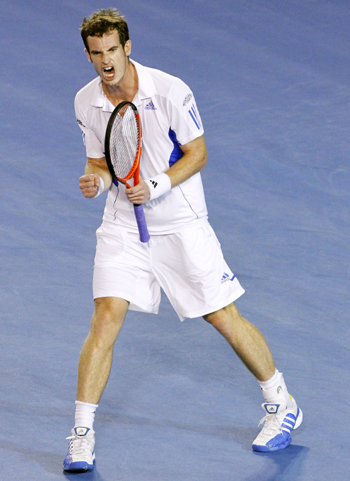
Britain's Andy Murray kept his head and moved one step closer to the ultimate prize as he beat Marin Cilic to reach the Australian Open final on Thursday.
The Scot overcame a slow start to get past the towering Croat 3-6, 6-4, 6-4, 6-2 and set up an opportunity to end Britain's 74-year-wait for a men's grand slam champion.
The fifth seed will now meet the winner of Friday's second semi-final between world number one Roger Federer and 2008 finalist Jo-Wilfried Tsonga of France.
It will be the second grand slam final for the 22-year-old, who was beaten by Federer in the 2008 US Open final.
"He (Cilic) showed incredible guts... he made it so tough for me and fought right till the end," Murray said in a courtside interview. "We're going to have more great matches in the future."
Murray held a 3-1 career record over Cilic but when the pair last met in the fourth round of last year's US Open the Croat thrashed the heavily-favoured Scot in three sets.
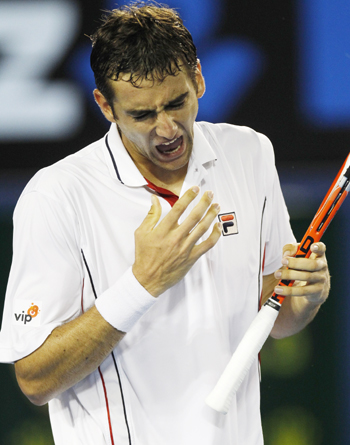
Cilic had played three five-set matches on his way to the semi-finals and spent more than 18 hours on court.
Murray had not dropped a set but the 14th seeded Croat ended that streak at the first attempt after breaking twice.
The Briton appeared dazed in the second set, seemingly unable to break serve before producing an amazing display of speed and court craft to set up a break point in the fifth game.
A Cilic drive hit the net cord and dropped on Murray's side. The 22-year-old managed to retrieve it, produced a reflex backhand volley, then turned and ran down a lob to drive a winner past the lunging Croat, bringing the crowd to their feet.
Murray let out an almighty yelp reminiscent of a Highlands battle cry and then sealed the crucial break that he held to seal the set.
"I just managed to chase it down. Honestly, I actually practise this shot quite a lot in training... and it was a very good shot and I managed to turn it around from there."
The match continued to be dominated from the baseline as both players hammered away in the third set, with Murray breaking in the third game before Cilic immediately struck back.
Murray, however, immediately set about quickening the pace in an effort to exploit Cilic's fatigue from previous exertions, and he broke again which allowed him to take the set.
The fight appeared to disappear from Cilic early in the fourth set when a double fault gave Murray a break in the third game, and a lucky net cord in the fifth allowed the Scot to break again.
While Cilic then managed to hold serve he was only delaying the inevitable, highlighted when Murray ran down a shot and hit an angled return from the tramlines that did not even go over the net but still landed in for a 30-15 lead in the final game.
The Briton then sealed the victory when Cilic's service return sailed over the baseline.